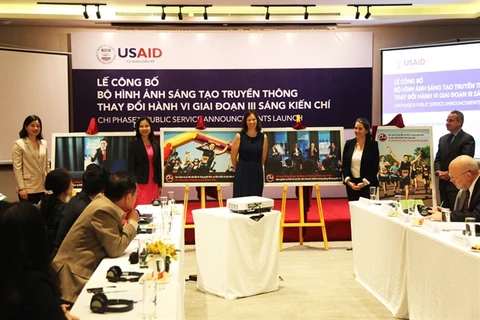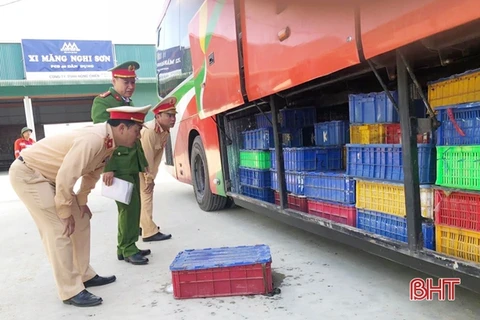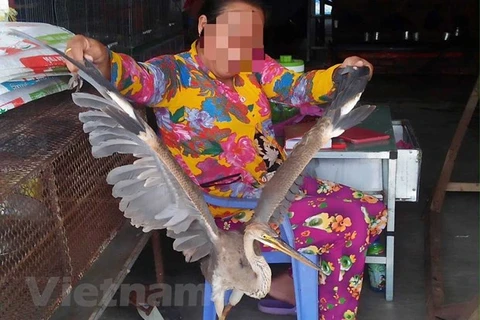 Wild birds put for sale publicly at Thanh Hoa wet market in Long An province, which is said to house thousands of endangered animals in the Mekong Delta region. (Photo: VietnamPlus)
Wild birds put for sale publicly at Thanh Hoa wet market in Long An province, which is said to house thousands of endangered animals in the Mekong Delta region. (Photo: VietnamPlus) Hanoi (VNA) - A mechanism to keep an eye on and strictly handle wildlife trade and killing is needed, Pham Van Hoa, a member of the National Assembly’s Committee for Legal Affairs, has said.
To conserve and protect endangered wild animals listed in the Vietnam Red Data Book from the risk of extinction, the Ministry of Natural Resources and Environment (MoNRE) recently issued Dispatch No. 4531/BTNMT-TCMT ordering the People’s Committees of centrally-run provinces and cities review and assess the breeding and farming of endangered rare and valuable species.
Grasping the situation, adding species in need of protection
A mechanism to keep an eye on and strictly handle wildlife trade and killing is needed, member of the National Assembly’s Committee for Legal Affairs Pham Van Hoa said.
Deputy Director of the Education for Nature – Vietnam (ENV) Bui Thi Ha noted that illegal wildlife poaching and trading have been on the rise over the past time, resulting in the swift decline in the number of wild animals and pushing various endangered species in Vietnam to the edge of extinction.
[Caged life kills species in Vietnam’s Red Data Book]
Statistics of the ENV, a non-governmental organisation on the reservation of the nature and the protection of the environment, showed that the oganisation together with relevant agencies rescued 146 wild animals in the first seven months of 2019, including sea turtles, monkeys and pangolins.
The figure partly demonstrates the ravaging wildlife poaching, trafficking and consumption in the country, becoming a hot issue and affecting conservation efforts.
For this part, Deputy General Director of the Vietnam Environmental Administration (VEA) Hoang Van Thuc said that the country’s biodiversity is under threat due to illegal wildlife trading and consumption.
 Along with wildlife trade, the confinement and killing of wild animals in the Mekong Delta remains rampant. Newborn eagles are brought to “hell markets” by poachers to serve at restaurants (Photo: VietnamPlus)
Along with wildlife trade, the confinement and killing of wild animals in the Mekong Delta remains rampant. Newborn eagles are brought to “hell markets” by poachers to serve at restaurants (Photo: VietnamPlus) The Government recently issued Decree No. 64-2019/ND-CP amending Article 7 of Decree No.160/2013/ND-CP dated November 12, 2013 on criteria for classification and management of endangered rare and valuable species in dire need of protection.
Sixteen species have been added to the list, including big-headed turtle, elongated tortoise, crested argus, king cobra and sarus crane, raising the total number of species under prioritised protection to 99 from the previous 83.
Nguyen Thi Van Anh of the Biodiversity Conservation Agency at the VEA said as per request of the MoNRE, every three years or when necessary, the Government will adjust and supplement the list of endangered rare and valuable species under prioritised protection.
The move also contributes to completing the legal framework in a bid to enhance the management of endangered rare and valuable species under prioritised protection as stipulated in the 2008 Law on Biodiversity, she underlined.
Tightening issuance of commercial breeding licences
To conserve and protect endangered wildlife, the MoNRE held a number of activities to survey and evaluate the breeding and farming of endangered rare and valuable species across the country in 2019, in collaboration with the People’s Committees of centrally-run provinces and cities.
 An owner of a booth at Tam Nong market in the Mekong Delta province of Dong Thap offers turtles for customers, telling them benefits of eating and keeping turtles and other species as pets as well as good fortune wild animals will bring in (Photo: VietnamPlus)
An owner of a booth at Tam Nong market in the Mekong Delta province of Dong Thap offers turtles for customers, telling them benefits of eating and keeping turtles and other species as pets as well as good fortune wild animals will bring in (Photo: VietnamPlus) The ministry asked the People’s Committees of centrally-run provinces and cities to report on the conservation of endangered species in the list, as well as the breeding and farming of the animals for the sake of monitoring and management.
[Turtles more likely to become extinct than other “Red Book” animals]
The addition reflects awareness and determination of State management agencies on environmental issues.
The revised Penal Code which took effect in the start of 2018 serves as an effective tool to deter wildlife criminals, Ha said. Accordingly, individuals and organizations violating regulations on wildlife may face prison terms of up to 15 years or fines worth 5 - 15 billion VND (215,200 - 645,600 USD).
It is necessary to reduce wildlife poaching and trading, contributing to biodiversity protection in Vietnam and the implementation of the Convention on International Trade in Endangered Species of Wild Fauna and Flora (CITES), she stressed.
Ha suggested relevant agencies spare no efforts to impose strict punishments on leaders of wildlife trafficking rings and their accomplices, particularly on the internet, and raise the sense of responsibility among local authorities in putting an end to wildlife consumption.
Agencies also need to tighten the issuance of licences for commercial breeding of wild animals and raise public awareness of the harm of wildlife poaching and trading, she added./.
 Actions needed to save turtles from being extinct. The Ministry of Natural Resources and Environment held a number of activities to survey and evaluate the breeding and farming of endangered rare and valuable species across the country in 2019. (Photo: VietnamPlus)
Actions needed to save turtles from being extinct. The Ministry of Natural Resources and Environment held a number of activities to survey and evaluate the breeding and farming of endangered rare and valuable species across the country in 2019. (Photo: VietnamPlus) 






















